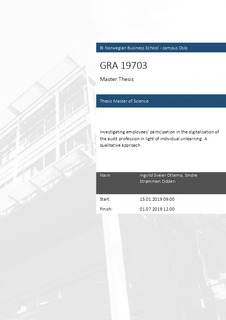Investigating employees’ participation in the digitalisation of the audit profession in light of individual unlearning: a qualitative approach
Master thesis

View/
Date
2019Metadata
Show full item recordCollections
- Master of Science [1621]
Abstract
The continuous development and advances in technology makes
organisational change a reality most organisations must face. This thesis explores
employee participation in digitalisation. In particular, a form of passive resistance
is investigated, as employees’ absence of adjustment to and adoption of change may
impede the successful implementation of digital work tools. This is investigated
through the concept of individual unlearning, which emphasises that employees
must move away from old work habits, behaviours and attitudes, in order to partake
in the new tools resulting from digitalisation. The thesis takes an exploratory
approach, by investigating the impact of digital infrastructure, employee
participation, and support through the lens of individual unlearning.
The findings from interviews with nine employees at BDO, a Norwegian
auditing firm, indicate that individual unlearning is a key aspect when
implementing digital work tools, and should be facilitated for prior to implementing
digital change. In relation, avoiding implementing rushed and flawed work tools
was found to be a key challenge. Furthermore, organisations must in addition to
providing sufficient training and informal support for the employees to actively
participate in changes, ensure that the employees are given the time and resources
needed to engage in such activities. The role of leadership was found to be of
importance, through providing information, clear expectations and guidelines
regarding digital work tools and its usage. A conceptual model is presented, and
later revised based on the data analysis and findings. Limitations, practical
implications, and suggestions for future research are also discussed.
Description
Masteroppgave(MSc) in Master of Science in Leadership and Organizational Psychology - Handelshøyskolen BI, 2019